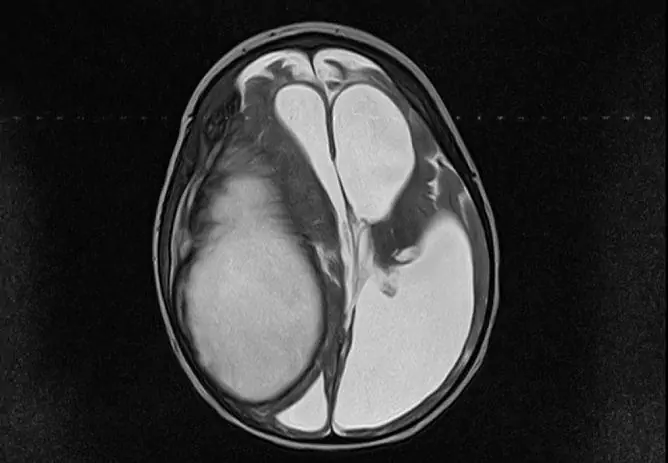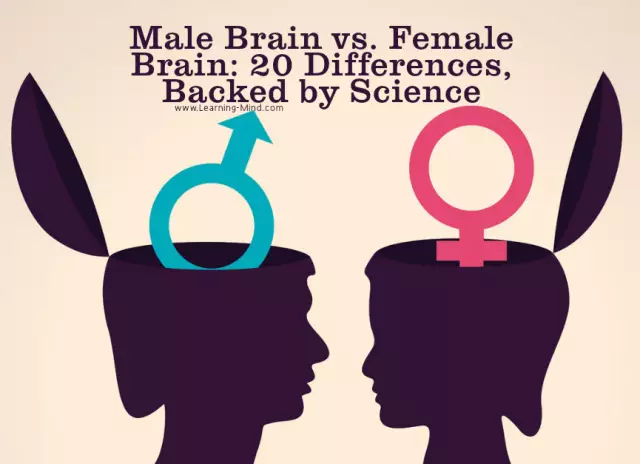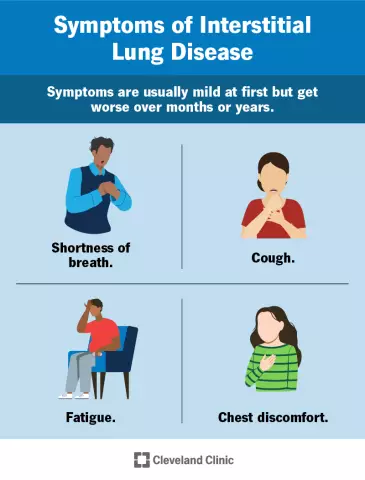- Author Rachel Wainwright wainwright@abchealthonline.com.
- Public 2023-12-15 07:39.
- Last modified 2025-11-02 20:14.
Brain cancer

Brain cancer is a common name that unites a whole group of malignant tumors originating from various brain tissues. Usually a tumor is named by its cellular composition, for example, neuromas - tumors of the cranial nerves, meningiomas - tumors from cells of the meninges, pituitary adenoma - a tumor from cells of glandular tissue, etc. Among other malignant diseases, brain cancer is quite rare; according to statistics, it accounts for 5-6% of all malignant tumors. Rarely it is primary, that is, it developed precisely in the brain, secondary brain cancer is more common, that is, metastases originating from a tumor formed in another organ.
Brain Cancer Causes
The reasons why a person develops brain cancer are still not fully understood, as in the case of many other cancers. In some cases, a previous trauma to the skull plays a role, sometimes signs of brain cancer first appear after an infectious disease. There is evidence of the influence of genetic predisposition, ionizing radiation, a high level of environmental pollution, intake of a large number of carcinogens with food. But these factors can only be attributed to contributing factors, since a direct relationship between them and brain cancer has not been established.
Brain Cancer Symptoms
Symptoms of brain cancer can be different, depending on which part of the brain the tumor is located in and what structures it squeezes. Most often, the first sign is dizziness and persistent headache, although sometimes it joins only in the advanced stage of brain cancer. The headache mainly appears in the morning, as a rule, intensifies with a certain position of the head, often the patient takes a forced position in which the headache is less. If the visual area of the brain is affected, vision is impaired, if the structures of the cerebellum are affected, coordination and gait suffer, speech becomes slurred, blurred; if the auditory nerve, then tinnitus and hearing loss are noted, and so on.
As the tumor grows, symptoms of increased intracranial pressure join, attacks of nausea and vomiting appear. Vomiting in this case brings only short-term relief. Problems with memory, attention, the ability to concentrate and orientate are noted, and more severe mental disorders, for example, hallucinations, may appear. Sometimes sensitivity is impaired in various parts of the body. Epileptic-type seizures may appear. Manifestations also depend on the stage of brain cancer, with extensive tumors that cause severe compression and intoxication, the symptoms of brain cancer will be more pronounced.
In general, the symptoms of brain cancer are not specific; inherent only in this disease, but a combination of several of them should serve as a reason to make an appointment with a doctor.
Brain Cancer Diagnosis
The most informative method for diagnosing brain cancer is brain MRI (magnetic resonance imaging) or CT (computed tomography). These methods make it possible to visualize the tumor - to determine its exact size, location and the degree of involvement of the surrounding structures in the tumor process. An experienced doctor can predict the cellular composition of a tumor by the symptoms of brain cancer and its localization, but in order to make an accurate diagnosis, a biopsy is necessary - a laboratory study of the tumor tissue. For obvious reasons, it is possible to take brain tissue for research only during the operation to remove the tumor, therefore, the final specified diagnosis in the diagnosis of brain cancer can be made only after surgery.
Brain Cancer Treatment

Treatment of all cancers is based on three pillars of oncology: surgical removal of the tumor, chemotherapy, and radiation. Treatment of brain cancer differs in that chemotherapy is ineffective here, due to the existing blood-brain barrier, which impedes the penetration of drugs into the brain tissue. Although at present, drugs have already been created for chemotherapy of brain cancer that overcome the barrier, nevertheless, chemotherapy remains an auxiliary, or, as oncologists say, an adjuvant method of treating brain cancer in this case.
The main treatment for brain cancer is surgical removal. Unfortunately, not all brain tumors can be removed completely. In some cases, the tumor is located among vital structures, and grows into them so strongly that a complete, total resection without damaging the brain substance is impossible. In this case, a so-called subtotal resection is performed, and the remaining areas of the tumor after the operation are destroyed with the help of radiation and chemotherapy.
Recently, in the treatment of brain cancer, techniques such as the cyberknife and the gamma knife have been widely and successfully used, which are precisely targeted effects on the tumor with high doses of radiation that cause its decay. Such methods are so effective that in the case of small tumors they can be used as the main method of treatment, eliminating the need for surgical intervention.
Brain cancer - prognosis
The prognosis of the disease depends on how early the treatment of brain cancer was started. In addition, the cellular composition of the tumor, the degree of maturity of tumor cells, and growth trends are also important for the prognosis of brain cancer. As with other cancers, brain cancer can be successfully treated if it is caught early in the process. Primary tumors have a more favorable prognosis. Since brain cancer is a tumor with a high tendency to relapse, doctors are cautious about cure, replacing this word with the term "stable remission", and recommending that patients who have achieved stable remission undergo regular preventive examinations.
YouTube video related to the article:
The information is generalized and provided for informational purposes only. At the first sign of illness, see your doctor. Self-medication is hazardous to health!






